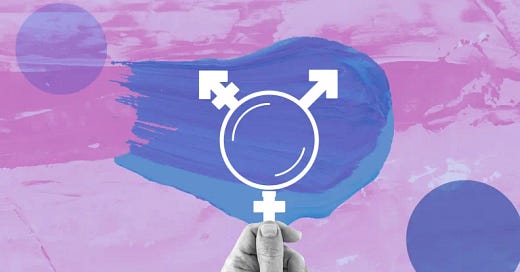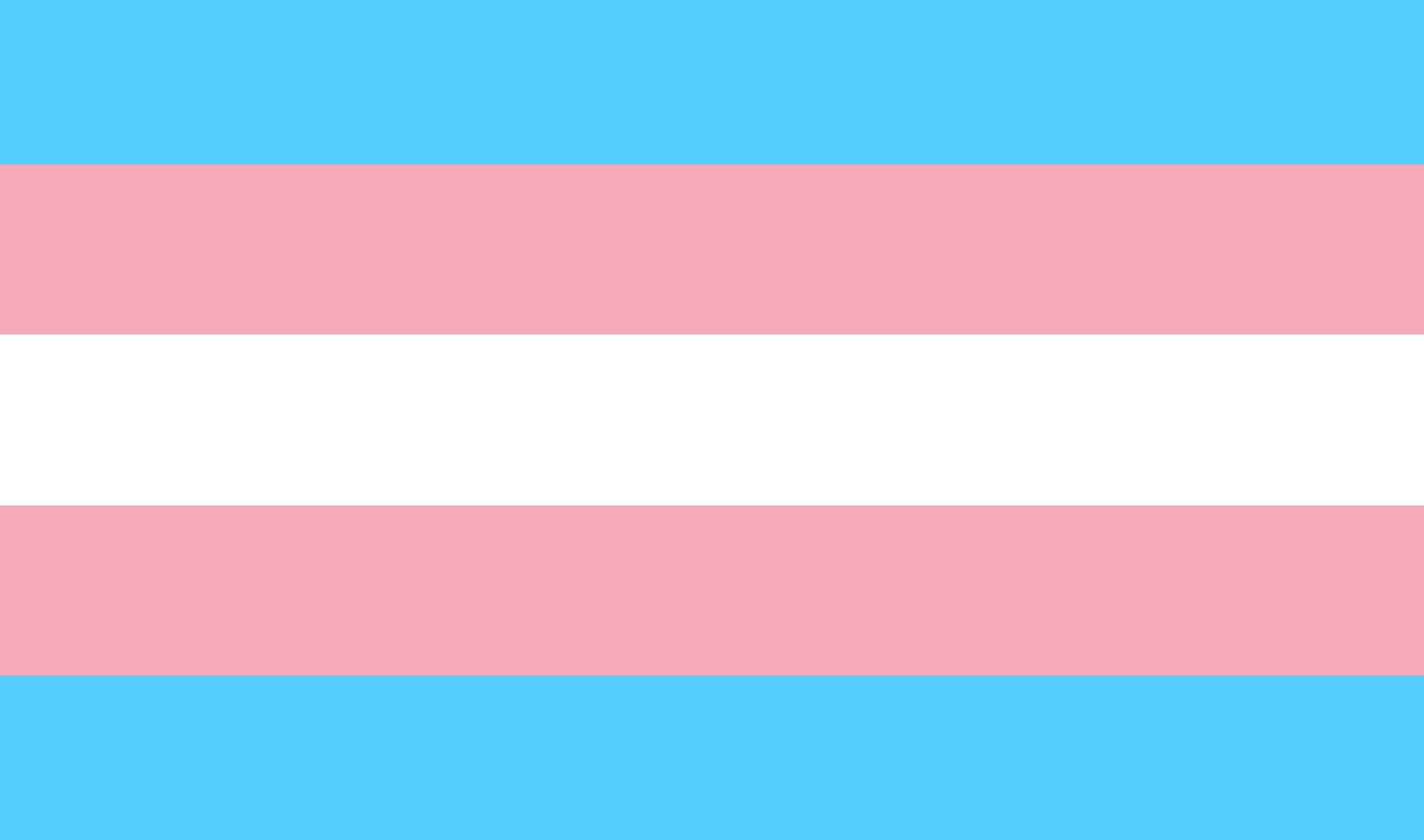Don’t Believe that the Church Just Took a Major Step Forward for Trans People
Just because we want it to be true doesn't make it so.
POP CULTURE SPIRIT WOW
I got so excited today when I saw the headlines yesterday about how the Vatican had just announced that transgender people can get baptized or become godparents.
As reported in the National Catholic Reporter, the Vatican’s Dicastery for the Doctrine of the Faith (the Catholic group responsible for evaluating policy on things like moral questions—basically, the Catholic Church’s School Board) has announced that "a transsexual--even one who has undergone hormone treatment and gender reassignment surgery--may receive baptism under the same conditions as other faithful.”
It sounds big, right? A huge step forward.
Except here’s the full sentence, with the opening paraphrased by NCR:
If it would not cause scandal or confusion among other Catholics, "a transsexual -- even one who has undergone hormone treatment and gender reassignment surgery -- may receive baptism under the same conditions as other faithful," said a document from the Vatican's Dicastery for the Doctrine of the Faith.
The Vatican did not say transgender people are able to be baptized, witness weddings or be godparents, full stop. It said, they can if it doesn’t cause scandal.
Which is exactly what conservative Catholics have been saying is the problem in the first place: Transgender people’s “choices” fly in the face of Church teaching and therefore at best cannot be supported and at worst are a sign of mental illness or a sin, yadda yadda yadda.
The document is filled with this kind of doublespeak. When deciding whether a trans person can be baptized or be a godparent, "Due pastoral prudence demands that every situation be wisely pondered, in order to safeguard the sacrament of baptism and especially its reception, which is a precious good to be protected, since it is necessary for salvation," the document said.
Again, this is exactly the argument used by transphobic church officials, right down to the strange idea that the sacrament of baptism must be “protected.”
In fact I’d say the Vatican just gave those officials better language to use: Prudence demands that we say no to baptizing transgender people. Sorryyy.
(Not coincidentally, this is one of the same arguments used on gay priests to keep them from coming out. Prudence demands it.)
The report goes on:
Special care must be taken, it said, when "there are doubts about the objective moral situation in which the person finds him- or herself, or about his or her subjective dispositions toward grace."
Yet again, exactly what transphobic officials say: A transgender person can’t be baptized, receive communion or go to our schools, because their “choice” to be trans shows they do not have a disposition toward grace. (Aka They refuse to accept church teaching.) Yes, we sure do love you, but your whole life makes us doubt you.
Also, let’s note the fact that the document decides at this point to mention genders —“him- or herself.” It sounds inclusive. Maybe that’s the intent.
But I note that a lot of transgender people use “they.” And so, maybe instead of an attempt at inclusion, this is a not-so-subtle way to assert what proper genders are and aren’t.
THE SLOW ROAST BAPTISM
You’ll hear people say that there are very good things in the document, too. It is saying that it is possible for transgender people to be baptized, after all. Before now we didn’t even have that, which is crazy!
But when you couch that change in so many provisos and exceptions, it pretty quickly starts to sound possible in the same way that visiting Englad in the winter and not getting rained on is possible, or visiting Twitter and not seeing hate speech. Sure, it’s possible. But not bloody likely. And also, unlike those two things, here there’s plenty of good reasons listed as to why it maybe shouldn’t happen all that often.
Even as the document acknowledges the “concerns” of bishops and pastors about baptizing transgender people, it does also argues that baptism is not a sacrament the church should be very cautious about withholding, because the blessing that baptism offers you is always working upon us. “It remains forever in the Christian as a positive disposition for grace, a promise and guarantee of divine protection, and as a vocation to divine worship and to the service of the Church."
That is to say, baptism is not a one and done event, either a “ Welcome to the community” (aka Hi Barbie) moment or a ward against harm (which is frankly what the sacrament means to a lot of families). Instead, getting baptized is like getting thrown in a slow cooker. The heat keeps working on you for the rest of your life. We’re all having the sin slow-cooked out of us so that we can be new and better people.
Except what is the nature of the sin that they’re saying transgender people are having cooked away? What are they being converted from and to? Given that the document repeatedly brings up this question of propriety and scandal, it sure sounds like the “promise” being offered here is that trans people may some day realize they shouldn’t be trans. It’s like we’re saying that baptism should be allowed because it could help slow cook the trans out of trans people.
A more hopeful (aka anarchic) version of this interpretation of baptism would be to say that as every baptized Catholic is also being slow cooked, the end result could/will be that the transphobic bishops and others will eventually realize just how wrong they are and see the magnitude of the harm that they’ve done, the lives that have been lost because of the stances they’ve taken.
But that’s not what this document talks about. This document is about what to do with trans people.
NCR’s report ends with yet another “Decide for yourself, of course, but it’s fine if you’re uncomfortable” line about being a godparent.
On the question of whether a trans person can be a godparent, the document said it is possible “under certain conditions,” but because the role is not a right, “pastoral prudence” is required to avoid the “danger of scandal” or confusion among the faithful.
This statement might be worst of all. It is literally nothing but ambivalence and hesitation.
Also, can I ask, since when did the Catholic Church decide that the scandal of being true to the Spirit moving within you constitutes a sin at all, let alone big time, no sacraments for you punishment? Jesus was scandalous all the damn time, and in the end that’s a big part of why people came to believe he was not just some great dude with an offensively great head of hair, but God.
Christians also talk about the cross as the greatest scandal, not in the sense that how dare people crucify God, but in terms of the scandal of God’s choice to allow God’s self to be murdered in the first place. This is not what normal gods do.
So our faith is built on the scandal of integrity, the scandal of faithfulness to a personal relationship with God, the scandal of love. But then 2000 years later somebody transgender wants to get baptized and we say that’s a bridge too far?
To quote a favorite podcast of mine: WTF?
Fox Mulder is a Terrible Lifestyle Choice
Now I say all this, and yet I see Catholics cheering this document on, saying it’s a big win for the Church and transgender people. And I’ve seen stuff like this before—lots of celebration for what seems like really not much improvement, if any.
My take, if I can use a pop culture reference, is this:
But at times like this, it can seem like our need for those beliefs to be true is obscuring the actual reality. Sure, trans people can be baptized now, if they’ve got the right bishop, and pastor, and parish. (Lotta ifs, man. Lotta iffs.)
But this document is still saying that baptizing a transgender person might be scandalous, that allowing a transgender person to be a godparent may very well confuse people and could be appropriately rejected on those grounds.
And it’s saying that if you do a baptize a transgender person, feel good about it despite the fact they’re sinners, because a little slow cooking might help.
None of that is good news for transgender people. None of it. It’s bad and it’s painful.
For me, to not see that is the danger of a belief that’s too tightly held: It becomes more important than the reality. In this case, more important than the actual flesh and blood human beings that are being affected by the teaching of the church.
As someone who has spent the last 31 years in a religious order (and one largely welcoming of queer people), I absolutely understand the desire to believe things are getting better or are good. But what’s the value of that belief if in this case it’s mostly not true?
Also, what’s the purpose of a belief like that? What is that belief for—and who is it for? Because baby, it’s not for transgender people.
Everybody Throws Momma From the Train Eventually
I wrote an article for U.S. Catholic last month ago about conversion in the New Testament. I don’t know if you ever noticed this, but in the Gospels, people’s first reaction to Jesus is often crazy bad. I’m not just talking the religious leader-types, either. Ordinary people hear Jesus talk and then suddenly they want to throw him off a cliff.
Even the “good” people who supposedly get Jesus end up arguing with him, ignoring him, dismissing his ideas and betraying him. Other than Martha and Marys—which coincidentally was the name of my sister’s middle school religious ed band—they all abandon him.
Here’s the thing: it happens so often, it’s obviously not a glitch in the story. It’s the point. In order to really change and change like Jesus, you first have to learn that you’ve got a long way to go. You have to see yourself for who you are.
That is to say, the kingdom that Jesus is trying to build, the beloved community, as Martin Luther King, Jr. called it, only comes about through the truth.
I get it: the church said that in theory transgender people can be baptized or become godparents. And in theory, that’s good.
But the rest of what it said is really problematic, and very painful.
That truth is the only road to some place better. And if we won’t walk it, we won’t get there.
11/9/23: After I released this last night, I was troubled by something I have in common with those Catholics that I saw celebrating this announcement: We’re not trans.
It’s the same problem we keep seeing in this church conversation and others. The people who should be subjects, speaking for themselves, are reduced to objects whose experience is defined by others who are not them.
I stand by my analysis that this new Vatican document is far less positive than is being reported. It does open the door to the baptism of transgender people, but it also couches that possibility with support of many transphobic tropes. Some will argue that’s classic Francis—rather than announce policy, he supports the important points being raised by all sides, and calls for the conversation which he believes will ultimately lead to the good.
But in this case we’re not talking about some theoretical religious matter, like the significance of the Eucharist. We’re talking about the value of a group of people.
And a document that affirms that simply allowing them to be baptized or godparents could constitute a scandal is no friend to those people.
But I wait with great interest to hear the reactions of transgender people.
Thanks for reading.
I am only able to do writing like this through the support of readers. If you liked this, my Venmo is scannable below. Subscriptions are also available on Substack.
Thanks again. See you back here later this week!










Jim - why don’t you post this on Outreach - they really need to see this there ? Nice Job
Yeah, this is all pretty awful, which is exactly what I would expect from the Catholic Church - like pretty much every other Christian sect, they do not appear to have either read and/or understood anything that Jesus said in the Bible. (They definitely have gone all in on the misogynistic and awful Paul, however - him they get.)